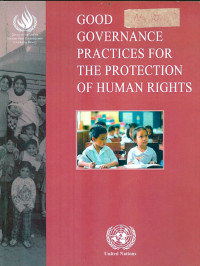
Text
Good governance practices for the protection of human rights
The former United Nations Commission on Human Rights emphasized, in a number of resolutions, the importance of an environment conducive to the full enjoyment of all human rights. It also underlined that good governance and human rights were mutually reinforcing and that the former was a precondition for the realization of the latter. Building on these resolutions, the Commission asked the Office of the United Nations High Commissioner for Human Rights (OHCHR) to provide practical examples of activities that strengthened good governance and promoted human rights. In response to this request, OHCHR is publishing Good Governance Practices for the Protection of Human Rights. This publication presents 21 case studies of governance reforms that have helped to better protect human rights. It builds on the Seminar on good governance practices for the promotion of human rights, which OHCHR organized in cooperation with the Government of the Republic of Korea and the United Nations Development Programme (UNDP) in Seoul in September 2004. Good governance and human rights are mutually reinforcing. Human rights principles provide a set of values to guide the work of Governments and other political and social actors. They also provide a set of performance standards against which these actors can be held accountable. Moreover, human rights principles inform the content of good governance efforts: they may inform the development of legislative frameworks, policies, programmes, budgetary allocations and other measures. However, without good governance, human rights cannot be respected and protected in a sustainable manner. The implementation of human rights 2 relies on a conducive and enabling environment. This includes appropriate legal frameworks and institutions as well as political, managerial and administrative processes responsible for responding to the rights and needs of the population. This publication defines good governance as the exercise of authority through political and institutional processes that are transparent and accountable, and encourage public participation. When it talks about human rights, it refers to the standards set out in the Universal Declaration of Human Rights and elaborated in a number of international conventions that define the minimum standards to ensure human dignity (see box)
Availability
| KP.1.000221 | KP.1 IND g | My Library | Available |
Detail Information
- Series Title
-
-
- Call Number
-
KP.1 INT g
- Publisher
- New York : United Nations., 2007
- Collation
-
iv, 79 hlm. ; 23 cm.
- Language
-
English
- ISBN/ISSN
-
978-92-1-154179-3
- Classification
-
KP.1
- Content Type
-
-
- Media Type
-
-
- Carrier Type
-
-
- Edition
-
-
- Subject(s)
- Specific Detail Info
-
-
- Statement of Responsibility
-
-
Other version/related
No other version available
File Attachment
Comments
You must be logged in to post a comment
 Computer Science, Information & General Works
Computer Science, Information & General Works  Philosophy & Psychology
Philosophy & Psychology  Religion
Religion  Social Sciences
Social Sciences  Language
Language  Pure Science
Pure Science  Applied Sciences
Applied Sciences  Art & Recreation
Art & Recreation  Literature
Literature  History & Geography
History & Geography